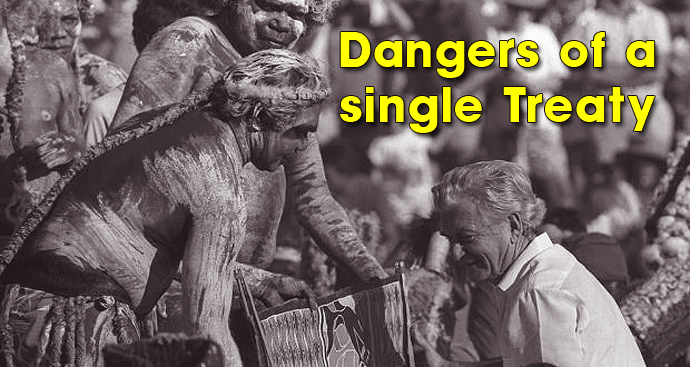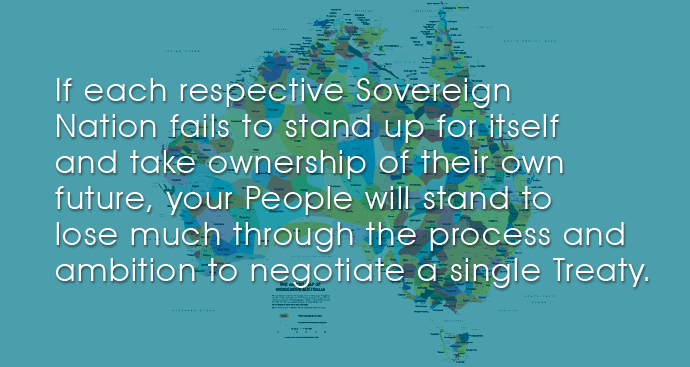Dangers of a single Treaty

In 1988 the former prime minister, Bob Hawke, received the Barunga statement from Galarrwuy Yunupingu in Arnhem Land, NT.

Ghillar, Michael Anderson 21 January 2018
It must be understood that a single Treaty, be it State or Federal, will cause more damage to our various Sovereign Nations than the Native Title Act as amended.
I offer this warning to our people that, if each respective Sovereign Nation fails to stand up for itself and take ownership of their own future, your People will stand to lose much through the process and ambition to negotiate a single Treaty.
We must always remember that the constitutional power of the executive colonial State government will only permit the States to negotiate on matters that are defined by those State constitutions. Whereas a national agreement with the Federated Commonwealth and the colonial States has the capacity to permit the State governments to negotiate Treaties, which include fundamental human rights.
It is the Commonwealth government's constitution that permits the international laws of jus cogens and erga omnes to have effect within the Australian legal jurisdiction. The States cannot negotiate these rights without the Commonwealth approving them.
Jus cogens refers to certain fundamental, overriding principles of international law, known as pre-emptory norms, from which no derogation is ever permitted, e.g. prohibition of genocide.
Erga omnes means "towards all" or "towards everyone". In legal terminology, erga omnes rights or obligations are owed toward all. For instance, a property right is an erga omnes entitlement, and therefore enforceable against anybody infringing that right.
If our People are led down a path through Treaty-Talks that suggest otherwise, you are to be cheated of your Sovereign inherent rights of all that exists in your Country.

Let me give you just a snippet of an example, which is monstrous in its outcome. The matter that I refer to is the Northern Territory Intervention case Wurridjal v The Commonwealth of Australia [2009] HCA 2 (2 February 2009) in which:
9. The plaintiffs allege, and it is not in dispute, that a five-year lease on the Maningrida land was granted to the Commonwealth pursuant to the NER Act. They say that the grant of the lease constituted acquisition of the Land Trust property and that the acquisition was required to be but was not on just terms within the meaning of s 51(xxxi) of the Constitution.
The Attorney-General, on behalf of the Commonwealth, made an application on the question of the jurisdictional right of the High Court to consider this constitutional question. As a consequence he shut down the case, through a 'demurrer', a gag order, in effect.
[A 'demurrer' is a pleading in a lawsuit that objects to or challenges a pleading filed by an opposing party. The word demur means "to object"; a demurrer is the document that makes the objection. ... The demurrer challenges the legal sufficiency of a cause of action in a complaint or of an affirmative defence in an answer.
Another clarifying definition is: A mostly obsolete motion put to a trial judge after the plaintiff has completed his or her case, in which the defendant, while not objecting to the facts presented, and rather than responding by a full defence, asks the court to reject the petition right then and there because of a lack of basis in law or insufficiency of the evidence. ]
This demurrer application by the Commonwealth reflects their uncertainty and concerns that what they are doing in confiscating Aboriginal Land without just terms compensation for the seized land, will prove our argument beyond reasonable doubt. The Commonwealth shut down this case because it would set a precedence that 'just terms compensation' was payable for all First Nations' lands stolen by the Crown.
On the other hand, the majority six judges could have easily refused the demurrer application, on the same basis that Justice Michael Kirby argued as the one dissenting opinion.
Reference: High Court bias-against first-peoples retiring Justice Kirby
Clearly, the judges are beholden to the Crown of England's right to assert sovereignty over this island continent and completely ignore justice for First Nations. In other words, they went back to the Colonial Secretary's Office statement in the 1820s when they were more interested in maintaining order in the colony and not law.
If the Commonwealth government goes to this extent to protect the States and Territories from our legal sovereign inherent rights, then any Treaty, which is far more reaching than a single court application, will shatter the skeletal framework of Australia's legal system. This is something the Commonwealth and the States are determined to avoid, but in the end decolonisation and an independent break from the Crown becomes inevitable - truth to power.
I do hope that organisers of these Treaty-Talks are courageous enough to invite, not necessarily dissenting arguments but, instead, debate on the true nature of the Australian government's objections that will certainly come. As surely as day follows night, Australia sits on a knife edge without sovereignty of its own and has to self-govern in right of the Crown of Britain.
People need to truly understand what this means. If these matters are not investigated and fully understood, then these proposed Treaty-Talks will be like chopping wood for practice.
There needs to be an honest appraisal of where the push for a Treaty got to over 30 years ago. The National Aboriginal Conference (NAC) Treaty process was no a failure. The Rhodes scholars, such as Labor Prime Minister, Bob Hawke and the like-minded people, have duties to ensure British dominance over the Federated colonies of Australia. With the assistance of the late Nugget Coombs and his puppets they ensured the death of the Treaty process more than three decades ago. It was those who were associated with the Federation of Land Councils that enabled the completion of the Treaty shutdown process.
The NAC, having completed five years of research and individual community consultations throughout Australia (which by the way was incomplete thanks to Bob Hawke's shutdown), learnt that a single Treaty at the national Commonwealth level is NOT the way to go.
The best formula that we could find at the time was the establishment of a national framework that the British, Australian States and Federal governments could agree upon with the NAC. The terms of that national framework would then be used to underpin individual First Nations' Treaties that ensured that each Nation was not diddled out of their sovereign inherent rights including, but not limited to, the maintenance of our sacred Laws
For more background see also:
Study on Treaties, Agreements and Other Constructive Arrangements Between States and Indigenous Populations July 1997, reported to the UN for the "Working Group on Indigenous Peoples" Final report by Mr. Miguel Alfonso Martinez Special Rapporteur
Ghillar Michael Anderson
Convenor of Sovereign Union of First Nations and Peoples in Australia
and Head of State of the Euahlayi Peoples Republic - Contact Ghillar

